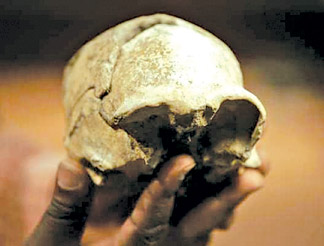Study links cooked food to early humans' growing brains
|

This well-preserved skull found in 2000 in Kenya is believed to
be that of Homo erectus. A study links brain size in early
humans with the development of a cooked diet. Pic: AP
|
Here's something for raw-food aficionados to chew on: Cooked food
might be a big reason humans were able to grow such large brains
compared with their body size, scientists say.If modern human ancestors
had eaten only raw food, they'd have to regularly feed more than nine
hours a day, according to a study published online in Proceedings of the
National Academy of Sciences. A pair of researchers from the Instituto
Nacional de Neurociencia Translacional in Sao Paulo, Brazil, decided to
try and help explain why modern humans' brains were able to grow so
large compared with their body size and why other primates' brains did
not.
They looked at the relative brain-to-neuron-counts of a host of
primates, from owl monkeys to baboons. For the most part, these primates
followed a linear pattern - the bigger the brain, the more neurons they
had.
Things get a bit tricky with the brain-to-body ratio, however -
partly because humans' brains are so large (and have so many neurons)
compared with their body size. Great apes' brains (including gorillas
and orangutans) make up something like 0.4 percent to 0.6 percent of
their body mass, while humans' brains take up a full two percent - even
though it drains some 20 percent of the body's resting metabolic rate.
(In non-human primates, the brain burns roughly nine percent of the
body's energy.)
The brain is the third most energy-expensive organ in the body,
behind only skeletal muscle and the liver, according to the study
authors. Researchers suspect this might explain why gorillas don't have
large brains, too - there's a limit to the energy they can take in to
sustain a big thinker, because there's only so much time in the day to
eat.
Previous work had shown that adding neurons to the primate brain cost
about six kCal per billion neurons. For a gorilla to have a brain that's
two percent the size of its body mass - as a human does - it would have
to add 122 billion neurons, corresponding to an extra two hours, 12
minutes of feeding - and a gorilla already spends 80 percent of a
12-hour day in feeding.Humans, however, have clearly overcome this
limitation - we have large brains, and we don't spend nine hours a day
eating. (Or at least, we don't actually need to.)
So how could humans have broken this pattern? A theory, as posited by
Harvard University primatologist Richard Wrangham, is that humans began
cooking their food, releasing nutrients locked in the raw food, saving
time they spent chewing the stuff.Had Homo erectus not cooked their
food, they would have had to spend more than eight hours a day feeding
their 62 billion neurons, the authors calculate, and Homo sapiens would
have had to spend more than nine hours a day sustaining their 76 billion
to 86 billion neurons.
Lucky for today's raw-food devotees, there are blenders to do much of
the work.
- Los Angeles Times
|


